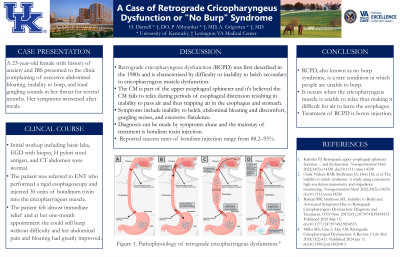Sunday Poster Session
Category: Esophagus
P0526 - A Case of Retrograde Cricopharyngeus Dysfunction or “No Burp” Syndrome
Sunday, October 27, 2024
3:30 PM - 7:00 PM ET
Location: Exhibit Hall E

Has Audio

Hannah Darnell, DO
University of Kentucky
Lexington, KY
Presenting Author(s)
Hannah Darnell, DO, Priya Abhyankar, MD, Alla Grigorian, MD
University of Kentucky, Lexington, KY
Introduction: Retrograde cricopharyngeus dysfunction (RCPD), also known as no burp syndrome, is a rare condition in which people are unable to burp. It occurs when the cricopharyngeus muscle, a muscle that makes up the upper esophageal sphincter, is unable to relax thus making it difficult for air to leave the esophagus. We present a patient with RCPD successfully treated with Botox injection.
Case Description/Methods: A 23-year-old female with history of anxiety and IBS presented to the clinic complaining of excessive abdominal bloating, inability to burp, and loud gurgling sounds in her throat. Her symptoms worsened after meals and were associated with abdominal discomfort and constipation. She implemented the FODMAP diet without symptom improvement. Initial workup including basic labs, EGD with biopsy, H pylori stool antigen, and CT abdomen were normal. She was recommended to start rifaximin, dicyclomine, and simethicone but saw no symptom improvement. She researched her symptoms online, found a condition called RCPD, and scheduled a visit with ENT for evaluation. ENT performed a rigid esophagoscopy in the operating room and injected 30 units of botulinum toxin into the cricopharyngeus muscle. The patient felt almost immediate relief and at her one-month appointment she could still burp without difficulty and her abdominal pain and bloating had greatly improved.
Discussion: RCPD was first described in the 1980s and is characterized by difficulty or inability to belch secondary to cricopharyngeus muscle (CM) dysfunction. The CM is part of the upper esophageal sphincter and although pathophysiology is not fully understood, it's believed that the CM fails to relax during periods of esophageal distension resulting in inability to pass air or food and thus trapping air in the esophagus and stomach. This leads to the classic symptoms of inability to belch, abdominal bloating and discomfort, gurgling noises, and excessive flatulence. Diagnosis can be made by symptoms alone and the mainstay of treatment is botulism toxin injection. A study by Oude Nijhius et al. suggests high resolution manometry may play a role in future diagnosis, however, the ability of botulinum toxin to restore burping is thought to be both diagnostic and therapeutic. Reported success rates of botulism injection range from 88.2–95%. Overall, RCPD is rare and requires a comprehensive approach involving gastroenterologist and otolaryngologists for proper diagnosis, treatment, and improving patient quality of life.
Disclosures:
Hannah Darnell, DO, Priya Abhyankar, MD, Alla Grigorian, MD. P0526 - A Case of Retrograde Cricopharyngeus Dysfunction or “No Burp” Syndrome, ACG 2024 Annual Scientific Meeting Abstracts. Philadelphia, PA: American College of Gastroenterology.
University of Kentucky, Lexington, KY
Introduction: Retrograde cricopharyngeus dysfunction (RCPD), also known as no burp syndrome, is a rare condition in which people are unable to burp. It occurs when the cricopharyngeus muscle, a muscle that makes up the upper esophageal sphincter, is unable to relax thus making it difficult for air to leave the esophagus. We present a patient with RCPD successfully treated with Botox injection.
Case Description/Methods: A 23-year-old female with history of anxiety and IBS presented to the clinic complaining of excessive abdominal bloating, inability to burp, and loud gurgling sounds in her throat. Her symptoms worsened after meals and were associated with abdominal discomfort and constipation. She implemented the FODMAP diet without symptom improvement. Initial workup including basic labs, EGD with biopsy, H pylori stool antigen, and CT abdomen were normal. She was recommended to start rifaximin, dicyclomine, and simethicone but saw no symptom improvement. She researched her symptoms online, found a condition called RCPD, and scheduled a visit with ENT for evaluation. ENT performed a rigid esophagoscopy in the operating room and injected 30 units of botulinum toxin into the cricopharyngeus muscle. The patient felt almost immediate relief and at her one-month appointment she could still burp without difficulty and her abdominal pain and bloating had greatly improved.
Discussion: RCPD was first described in the 1980s and is characterized by difficulty or inability to belch secondary to cricopharyngeus muscle (CM) dysfunction. The CM is part of the upper esophageal sphincter and although pathophysiology is not fully understood, it's believed that the CM fails to relax during periods of esophageal distension resulting in inability to pass air or food and thus trapping air in the esophagus and stomach. This leads to the classic symptoms of inability to belch, abdominal bloating and discomfort, gurgling noises, and excessive flatulence. Diagnosis can be made by symptoms alone and the mainstay of treatment is botulism toxin injection. A study by Oude Nijhius et al. suggests high resolution manometry may play a role in future diagnosis, however, the ability of botulinum toxin to restore burping is thought to be both diagnostic and therapeutic. Reported success rates of botulism injection range from 88.2–95%. Overall, RCPD is rare and requires a comprehensive approach involving gastroenterologist and otolaryngologists for proper diagnosis, treatment, and improving patient quality of life.
Disclosures:
Hannah Darnell indicated no relevant financial relationships.
Priya Abhyankar indicated no relevant financial relationships.
Alla Grigorian indicated no relevant financial relationships.
Hannah Darnell, DO, Priya Abhyankar, MD, Alla Grigorian, MD. P0526 - A Case of Retrograde Cricopharyngeus Dysfunction or “No Burp” Syndrome, ACG 2024 Annual Scientific Meeting Abstracts. Philadelphia, PA: American College of Gastroenterology.
